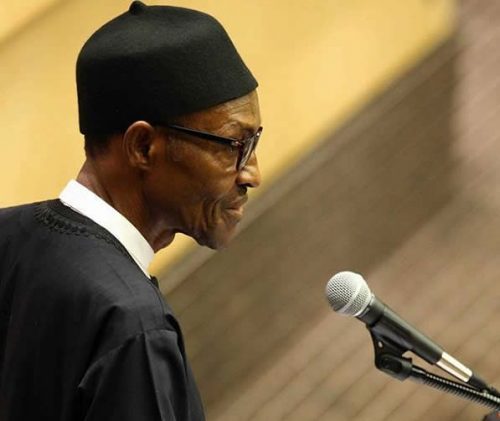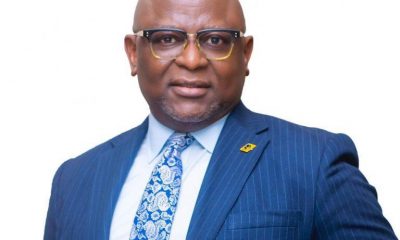celebrity radar - gossips
Reps To Buhari: Suspend Ban On Importation Of Cars Through Land Borders

President Muhammadu Buhari has been urged by the House of Representatives to suspend the ban on importation of new and used cars through land borders.
The ban that was announced on December 5, 2016 by the Nigerian Customs Service (NCS) was due to take off from January 1, 2017.
The lawmakers however said the policy was too harsh as it is bound to pile more economic miseries on the majority of Nigerians that are already groaning under the prevailing economic recession.
The decision of the lawmakers followed the adoption of a motion by Abdulahi Salame (APC, Sokoto) who noted that the percentage of Nigerians who can afford cars has declined drastically following the decline in the value of naira, inflation, unemployment and high cost of living that has bedeviled Nigeria where over 80 percent of the population live below $200 a day.
Salame noted that, “With its powers under Section 18 of the Customs and Excise Management Act, the government can restrict the movement of goods into and out of Nigeria by land or inland waters and to appoint customs stations, but similar exercise of such powers on rice importation through the land borders in April 2016, has led to untold hardships on Nigerians as a bag of rice now sells for between N20, 000 and N23,000 as against N8,000 few months ago.
“We are also aware that the government has not put in place alternative measures to ensure that Nigerians will have access to cars since it is cheaper to buy cars from neighbouring countries and still generate revenue by ensuring that our borders are secured to prevent smuggling and also that there will not be job losses.
“Meanwhile, some of those making these policies have failed to patronize made-in-Nigeria goods, especially Nigerian assembled vehicles which are, in any case unaffordable to over 80 percent of Nigerians who can only afford fairly used imported cars.
“It is of concern that despite the pitiable state of most Nigerians occasioned by unemployment, lack of funds for survival and high cost of living which has sent many to their early graves, the government is adopting a policy that will further increase the sufferings of the masses at this critical time the country is in recession.
“It is equally worrisome that the ban will cause more harm than good as it will certainly lead to increase in smuggling, deprive poor Nigerians of access to acquiring vehicles, skyrocket the price of cars cleared at the wharf, increase inflation and further mount pressure on the already weak naira and lead to idleness, insecurity and criminality at the border points”.
Lawmakers that spoke in favour of the motion noted that it is the masses that would be affected more by the new policy.
According to them, the reason put forward about payment of duties was not enough to punish the entire country because non-payment of duties was carried out with the active connivance of security officials at the borders.
The lawmakers also argued that the ban was against the Economic Community of West African States (ECOWAS) Protocols on movement of goods and services.
The lawmakers said to implement the policy at a period of recession amount to Nigerians paying for the irresponsibility of agencies that should collect port duties on imported cars.
The lawmakers that supported the policy however noted that most policies of the administration of President Buhari were aimed at correcting fundamental and structural anomalies inherent in the system.
While they regretted that policies of this administration were often misunderstood and attacked, the antagonists of the bill recalled that three decades ago, Nigeria was the hub of economic activities in the sub-region, an advantage that has now been eroded due to reckless importation of unnecessary goods and services.
According to the lawmakers, this has reflected in job loss, with Nigeria not only becoming a dumping ground but also losing its technological development potentials to her neighbours.
They noted that as long as the government refused to do what it supposed to do by taking hard decisions, the country will remain on the path that has taken Nigeria nowhere so far.
As part of their resolution, the lawmakers urged the Federal government to ensure that the law enforcement agencies, especially those working at the borders, are diligent in their duties by ensuring that import charges through the land borders are paid when due and remitted to the government.
The House also urged the Federal government to install border security and surveillance equipment for effective monitoring to address the recurring menace of smuggling and ensure a maximum revenue generation on all lawfully imported goods.
The lawmakers equally urged the Federal government to expand its plan on youths empowerment programs by developing skills acquisition centers in border areas so as to enable the youth to acquire skills necessary for the type of businesses that are being carried out in the border areas and also employ more people from those areas into the border security agencies as they have relevant experiences on how goods are being moved in and out of the country.
Committees on Governmental Affairs and Customs and Excise were mandated to ensure implementation of the resolutions and report back within six weeks for further legislative action.
The motion was unanimously adopted after it was put to a voice vote by the Speaker, Yakubu Dogara.
celebrity radar - gossips
Another Feather for Nollywood Icon Fidelis Duker

**Another Feather for Nollywood Icon Fidelis Duker
*Lagos, Nigeria* — In a remarkable celebration of artistic achievement, renowned Nollywood figure Fidelis Duker received yet another prestigious accolade last weekend, solidifying his role as a key player in the growth of the Nigerian and African film industries. The award was presented in a ceremony held at Duker’s Lagos office by esteemed film and theatre director, Mr. Alex Eyengho, founder of the Warri International Film Festival, alongside Marketing and Strategy Director, Mrs. Matel Eyengho.
The recent recognition builds upon Duker’s previous achievement at last year’s ECOFEST in Dakar, where he was honored with a Lifetime Achievement Award. This latest accolade is a testament to his unwavering dedication and substantial contributions to the cinematic landscape.
“I am truly humbled by this recognition,” Duker expressed during the event. In his speech, Alex Eyengho lauded Duker’s pioneering efforts in establishing significant film festivals in Nigeria, particularly the Abuja International Film Festival, which has played a vital role in promoting local talent and storytelling.
Eyengho emphasized, “Fidelis has not only paved the way for emerging filmmakers but has also helped elevate Nigerian cinema on the global stage. His creative vision and commitment inspire all of us in the industry.”
As Duker reflects on this honor, he acknowledges the importance of teamwork and collaboration in achieving success. “This acknowledgment reaffirms to my team and me that our work is being observed, and it motivates us to continue contributing to the development of our sector,” he stated.
With numerous projects on the horizon, Duker remains a relentless advocate for the growth and recognition of African cinema. His latest recognition is yet another testament to the vibrant and evolving landscape of Nollywood, as industry leaders like him continue to inspire future generations.
As the film industry anticipates the next phase of development, Duker’s continued influence signals a promising future for filmmakers in Nigeria and across the continent.
celebrity radar - gossips
E‑Money’s Grand Gesture: A Closer Look at the SUV Gift to Chinedu “Aki” Ikedieze

E‑Money’s Grand Gesture: A Closer Look at the SUV Gift to Chinedu “Aki” Ikedieze
By George Omagbemi Sylvester | Published by SaharaWeeklyNG
“Public Generosity, Celebrity Loyalty and the Symbolism of Wealth in Nigeria’s Entertainment Elite.”
On Tuesday, February 17, 2026, Nigerian billionaire and entrepreneur Emeka Okonkwo, widely known as E‑Money, once again captured national attention with a lavish and highly publicised act of generosity, gifting a brand‑new 2024/2025 Ford SUV to veteran Nollywood actor Chinedu Ikedieze, affectionately called Aki, during his high‑profile birthday celebration.
The event, held in Lagos amidst a constellation of entertainers, business figures and socialites, was itself part of an annual tradition in which E‑Money marks his birthday (on February 18) with large‑scale giveaways and spectacular shows of material philanthropy. This year, he announced the gift of over 30 cars to friends, staff and family, a gesture that quickly went viral as videos and images circulated across social media platforms.
In the case of Ikedieze, E‑Money’s gift appeared to be deeply personal. During the festivities, E‑Money stood beside his elder brother, Grammy‑nominated musician KCee and recounted how Ikedieze stood by him at his 2007 wedding. The billionaire explained that the SUV was a “token of appreciation” for the enduring support the actor had shown over the years which is a narrative that blends friendship with public celebration.
Ikedieze, a Nollywood staple with a career spanning more than two decades and over 150 film credits, including the iconic Aki na Ukwa franchise, visibly reacted with humble surprise as he received the vehicle, bowing his head in respect and gratitude. The actor later shared the moment on his Instagram account with a caption celebrating the gift, further fuelling online engagement around the event.
Beyond the spectacle, this incident underscores evolving dynamics in Nigerian celebrity culture and the intersection of wealth, influence and reciprocity. Sociologist Dr. Chinedum Uche of the University of Lagos, speaking on the broader implications of such high‑profile gifts, notes: “Philanthropy that is highly publicised can reinforce social bonds, but it also reflects a culture where generosity is intertwined with reputation economy; where giving becomes as much a social signal as it is an act of kindness.” The quote highlights how public acts of wealth transfer among elites serve layered social functions that extend beyond pure altruism.
Critics of such displays argue that ostentatious giveaways, particularly in a country with stark economic disparities, risk amplifying social envy and exacerbating perceptions of inequality. Economist Dr. Ifunanya Nwosu from the Lagos Business School observes: “In societies marked by economic stratification, celebrity largesse may inspire admiration, but it can also inadvertently highlight structural inequities; prompting questions about systemic investment in public welfare versus individual generosity.”
Still, supporters maintain that E‑Money’s annual tradition (which has in past years included cash gifts to his brother KCee, comedians and even domestic staff) reflects genuine gratitude and a commitment to uplifting his immediate circle, albeit within the private sphere.
For Ikedieze, the SUV stands both as a heartfelt gesture from a longtime friend and a public affirmation of their enduring relationship. As the video of the moment continues to circulate, the broader narrative has ignited discussions about the role of private wealth in public life, celebrity culture and how acts of giving are interpreted in contemporary Nigerian society.
In a landscape where influence and generosity often play out in equal measure on public stages, E‑Money’s gift to Aki is more than a headline, it is a flashpoint in ongoing debates about wealth, friendship and visibility in Nigeria’s entertainment and entrepreneurial ecosystem.
celebrity radar - gossips
Spiritual Reality: Wicked People Are Possessed by Wicked Spirits — Dr. Christian Okafor

Spiritual Reality: Wicked People Are
Possessed by Wicked Spirits — Dr. Christian Okafor
…..“You don’t need to offend them before they attack you.”
…..“Your only true help comes from God.”
Demons are strategic and calculating. They detect threats quickly and position themselves to resist any power that may expose or overpower them.
According to the Generational Prophet and Senior Pastor of Grace Nation Global, Christian Okafor, spiritual intelligence operates both in light and in darkness—and believers must understand this reality.
Dr. Okafor delivered this message on Thursday, February 19, 2026, during the midweek Prophetic, Healing, Deliverance and Solutions Service (PHDS) held at the international headquarters of Grace Nation Worldwide in Ojodu Berger, Lagos, Nigeria.
The Operations of Demons
Teaching on the subject “Spiritual Reality” with the subtitle “Operations of Demons,” the Man of God explained that when demons possess individuals, their behavior changes. Such people may attack, bully, or resist those sent by God to help them, unknowingly rejecting divine assistance and prolonging their struggles.
“You don’t need to offend a demon before it attacks you,” he said. “What you carry is enough to provoke opposition. The greater your potential, the greater the battle.”
Dr. Okafor noted that many believers misinterpret battles as signs that God has abandoned them. However, he explained that some battles are permitted for growth, training, and divine glorification.
According to him, God may allow certain confrontations so that believers understand spiritual warfare and emerge stronger.
“Some battles are necessary,” he emphasized. “They push you into your turning point.”
He further stated that God does not respond to lies, blackmail, or bullying. He responds to His Word. Therefore, opposition is not proof of God’s absence, but often evidence of destiny at work.
The Weapon Against Demonic Attacks
Addressing solutions, Dr. Okafor described prayer as the strongest weapon against satanic operations.
“Prayer is the license that invites God into your battles,” he declared. “God does not intrude—He responds to invitation.”
According to the Apostle of Altars, understanding the principles and discipline of prayer enables believers to receive divine strategies for overcoming demonic resistance. Without prayer, he warned, spiritual help cannot be activated.
“You cannot receive help without God,” he concluded. “And you cannot engage God without prayer.”
Manifestations at the Service
The midweek gathering was marked by a strong move of the Spirit, with testimonies of deliverance, miracles, restoration, and solutions to various challenges presented before God. Several individuals reportedly committed their lives to Christ during the service.
-

 celebrity radar - gossips6 months ago
celebrity radar - gossips6 months agoWhy Babangida’s Hilltop Home Became Nigeria’s Political “Mecca”
-

 society6 months ago
society6 months agoPower is a Loan, Not a Possession: The Sacred Duty of Planting People
-

 society5 months ago
society5 months agoReligion: Africa’s Oldest Weapon of Enslavement and the Forgotten Truth
-

 news6 months ago
news6 months agoTHE APPOINTMENT OF WASIU AYINDE BY THE FEDERAL GOVERNMENT AS AN AMBASSADOR SOUNDS EMBARRASSING











You must be logged in to post a comment Login